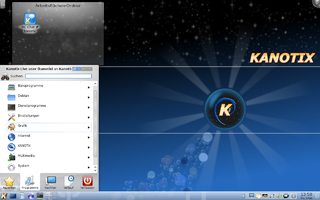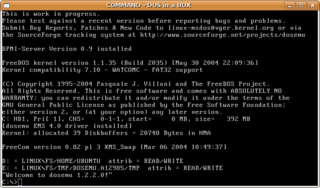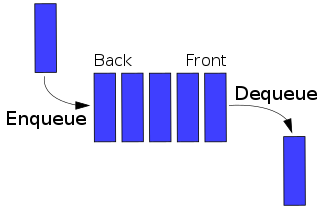
Debian, also known as Debian GNU/Linux, is a Linux distribution composed of free and open-source software, developed by the community-supported Debian Project, which was established by Ian Murdock on August 16, 1993. The first version of Debian (0.01) was released on September 15, 1993, and its first stable version (1.1) was released on June 17, 1996. The Debian Stable branch is the most popular edition for personal computers and servers. Debian is also the basis for many other distributions, most notably Ubuntu.

GNU is an extensive collection of free software, which can be used as an operating system or can be used in parts with other operating systems. The use of the completed GNU tools led to the family of operating systems popularly known as Linux. Most of GNU is licensed under the GNU Project's own General Public License (GPL).

YaST is a Linux operating system setup and configuration tool.

Advanced package tool, or APT, is a free-software user interface that works with core libraries to handle the installation and removal of software on Debian, and Debian-based Linux distributions. APT simplifies the process of managing software on Unix-like computer systems by automating the retrieval, configuration and installation of software packages, either from precompiled files or by compiling source code.
dpkg is the software at the base of the package management system in the free operating system Debian and its numerous derivatives. dpkg is used to install, remove, and provide information about .deb packages.

The Linux Standard Base (LSB) was a joint project by several Linux distributions under the organizational structure of the Linux Foundation to standardize the software system structure, including the Filesystem Hierarchy Standard. LSB was based on the POSIX specification, the Single UNIX Specification (SUS), and several other open standards, but extended them in certain areas.
LinuxDoc is an SGML DTD which is similar to DocBook. It was created by Matt Welsh and version 1.1 was announced in 1994. It is primarily used by the Linux Documentation Project. The DocBook SGML tags are often longer than the equivalent LinuxDoc tags.

Kanotix, also referred to as KANOTIX, is an operating system based on Debian, with advanced hardware detection. It can run from an optical disc drive or other media i.e. USB-stick without using a hard disk drive.
deb is the format, as well as filename extension of the software package format for the Debian Linux distribution and its derivatives.
A chroot on Unix and Unix-like operating systems is an operation that changes the apparent root directory for the current running process and its children. A program that is run in such a modified environment cannot name files outside the designated directory tree. The term "chroot" may refer to the chroot(2) system call or the chroot(8) wrapper program. The modified environment is called a chroot jail.

DOSEMU, stylized as dosemu, is a compatibility layer software package that enables DOS operating systems and application software to run atop Linux on x86-based PCs.

ifconfig is a system administration utility in Unix-like operating systems for network interface configuration.
loadlin is a Linux boot loader that runs under 16-bit real-mode DOS. It allows the Linux system to load and replace the running DOS without altering existing DOS system files.

PulseAudio is a network-capable sound server program distributed via the freedesktop.org project. It runs mainly on Linux, various BSD distributions such as FreeBSD and OpenBSD, macOS, as well as Illumos distributions and the Solaris operating system. It serves as a middleware in between applications and hardware and handles raw PCM audio streams.

iproute2 is a collection of userspace utilities for controlling and monitoring various aspects of networking in the Linux kernel, including routing, network interfaces, tunnels, traffic control, and network-related device drivers.

Uzbl is a discontinued free and open-source minimalist web browser designed for simplicity and adherence to the Unix philosophy. Development began in early 2009 and is still considered in alpha software by the developers. The core component of Uzbl is written in C, but other languages are also used, most notably Python. All parts of the Uzbl project are released as free software under GNU GPL-3.0-only.

netsniff-ng is a free Linux network analyzer and networking toolkit originally written by Daniel Borkmann. Its gain of performance is reached by zero-copy mechanisms for network packets, so that the Linux kernel does not need to copy packets from kernel space to user space via system calls such as recvmsg . libpcap, starting with release 1.0.0, also supports the zero-copy mechanism on Linux for capturing (RX_RING), so programs using libpcap also use that mechanism on Linux.
Software Package Data Exchange (SPDX) is an open standard for software bill of materials (SBOM). SPDX allows the expression of components, licenses, copyrights, security references and other metadata relating to software. Its original purpose was to improve license compliance, and has since been expanded to facilitate additional use-cases, such as supply-chain transparency and security. SPDX is authored by the community-driven SPDX Project under the auspices of the Linux Foundation.

A network scheduler, also called packet scheduler, queueing discipline (qdisc) or queueing algorithm, is an arbiter on a node in a packet switching communication network. It manages the sequence of network packets in the transmit and receive queues of the protocol stack and network interface controller. There are several network schedulers available for the different operating systems, that implement many of the existing network scheduling algorithms.
ROCm is an Advanced Micro Devices (AMD) software stack for graphics processing unit (GPU) programming. ROCm spans several domains: general-purpose computing on graphics processing units (GPGPU), high performance computing (HPC), heterogeneous computing. It offers several programming models: HIP, OpenMP/Message Passing Interface (MPI), OpenCL.













